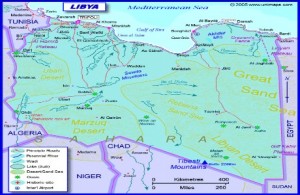 London – Brent crude futures rose above $106 a barrel on Monday as investors bought after steep falls in the previous session and as tension in major oil exporter Libya escalated.
London – Brent crude futures rose above $106 a barrel on Monday as investors bought after steep falls in the previous session and as tension in major oil exporter Libya escalated.
Tensions in eastern Libya, where the majority of oil production remains shut in due to blockades at oil export terminals, have intensified after two different groups declared independence for the Cyrenaica region.
Leaders of a movement in Libya’s oil-rich east unilaterally declared a regional government on Sunday, in a further challenge to the Organisation of the Petroleum Exporting Countries (OPEC) member’s fragile central government.
On Sunday, Ibrahim al-Jathran, head of the Petroleum Defence Guards and the instigator of the blockades at the Es Sider, Ras Lanuf, Marsa el-Hariga and Zueitina oil terminals, revealed his new cabinet, having declared the formation of a “government” — the Political Bureau of Cyrenaica (PBC) — in late October.
Another group has also formed a new government in the eastern region, called the Cyrenaica Transitional Council.
Its president is Ahmed Zubair al-Senussi, who said last week he wanted to join forces with the PBC but Jathran had wanted only to pursue his own agenda, the Libya Herald reported Sunday.
While the two rival “governments” look to take control of the region, and its key oil infrastructure, the government in Tripoli seems powerless to halt the momentum in the east.
Prime Minister Ali Zeidan has said he would not resort to force to end the standoff and analysts believe one of the only solutions would be for the government in Tripoli to implement a revenue-sharing plan with NOC’s subsidiaries throughout the country.
There had been hope of a breakthrough in the east last week when NOC lifted force majeure on crude exports from the eastern port of Marsa el-Hariga after the security situation at the port improved.
NOC declared force majeure on loadings out of Marsa el-Hariga on September 12, saying the port had been unable to carry out crude loadings because of circumstances beyond its control.
Crude traders remained cautious about the lifting of the force majeure, though, pointing to the recent volatility of exports from Libya following the flare up in protests at the Sharara crude field and Mellitah export terminals.
Oil infrastructure across Libya has been hit by protests and strikes since May, which have caused exports to grind to a near halt at times during the summer and autumn.
Production has fallen to lows not seen since the end of the 2011 civil war.
Last week, a senior NOC official said Libyan oil production had fallen to just 250,000 b/d due to the shut-in of the major Sharara field in the west of the country.


